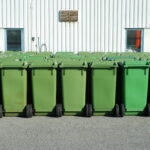Many Massachusetts food service businesses are working to reduce waste to help them cut costs, limit excess inventory, and comply with the Massachusetts Department of Environmental Protection’s commercial organics waste ban. These efforts are more important than ever as business and institutions recalibrate in response to COVID-19 related closures and disruptions. The Boston Globe recently…
As restaurants, event spaces, and other businesses with food service options experience restrictions and closures due to COVID-19, many end up with surplus food in their inventory. Rather than discard it, businesses and institutions can connect with local food rescue organizations. WWLP recently included another unique outlet for food donation – the Zoo in Forest…
As many Massachusetts restaurants, institutions, event venues, and other businesses face temporary closures due to COVID-19, there is a large amount of surplus food that cannot be utilized or sold. To keep this food out of the trash and help support the local community, many of these entities are seeking ways to donate edible food…
Recent restrictions and closures due to COVID-19 may leave your business or institution with excess food in your inventory. Whether you are a restaurant, college or university, supermarket, or other business, consider donating your surplus, edible food to the local community rather than throwing it away. Many food rescue organizations are currently able to distribute…
While appealing to customers, salad bars and other buffets can generate sizeable quantities of food waste. Colleges and universities, restaurants, hospitality venues, and other businesses with this food service model often face challenges when balancing the appearance of abundance with food waste reduction and the potential for overproduction. LeanPath recently reported on a number of…
Anaerobic digestion infrastructure has expanded in Massachusetts, creating an important outlet for commercial organic waste. One company, Vanguard Renewables, operates five anaerobic digesters on dairy farms across the state, which provide opportunities for supermarkets, food manufacturers, restaurants, and other businesses to divert their food material from disposal and comply with the Massachusetts commercial organics waste…
A recent article from Business West spotlights several businesses in Western Massachusetts that are using various strategies to tackle unnecessary waste. As the article demonstrates, there are often many opportunities for businesses to make small operational and purchasing changes that prioritize reuse, recycling, and food waste diversion. Monsoon Roastery, a coffee roastery in Springfield,…
On November 14, UMass Dartmouth hosted RecyclingWorks in Massachusetts (RecyclingWorks), the Massachusetts Department of Environmental Protection (MassDEP), and the US Environmental Protection Agency (EPA) for the 2019 Fall WasteWise Forum. This year’s fall forum focused on reducing contamination in recycling collection programs and using technology to reduce food waste. Below is a summary of the day’s highlights. Welcome and Updates The…
Despite significant increases in food waste diversion, Massachusetts businesses and institutions still dispose of an estimated 640,000 tons of food material in the trash each year. A recent GreenBiz article looks at opportunities for corporate and institutional foodservice operations to divert food waste and realize cost savings. The article identifies four key strategies, listed below,…
Lawrence General Hospital is a private hospital providing services to nearly 325,000 patients annually. The 500,000 square foot facility employs 1,900 staff members and houses 186 beds, as well as a full-service cafeteria that provides meals for patients, visitors, and staff. The hospital engaged with RecyclingWorks in Massachusetts (RecyclingWorks) in early 2019 for assistance in…

